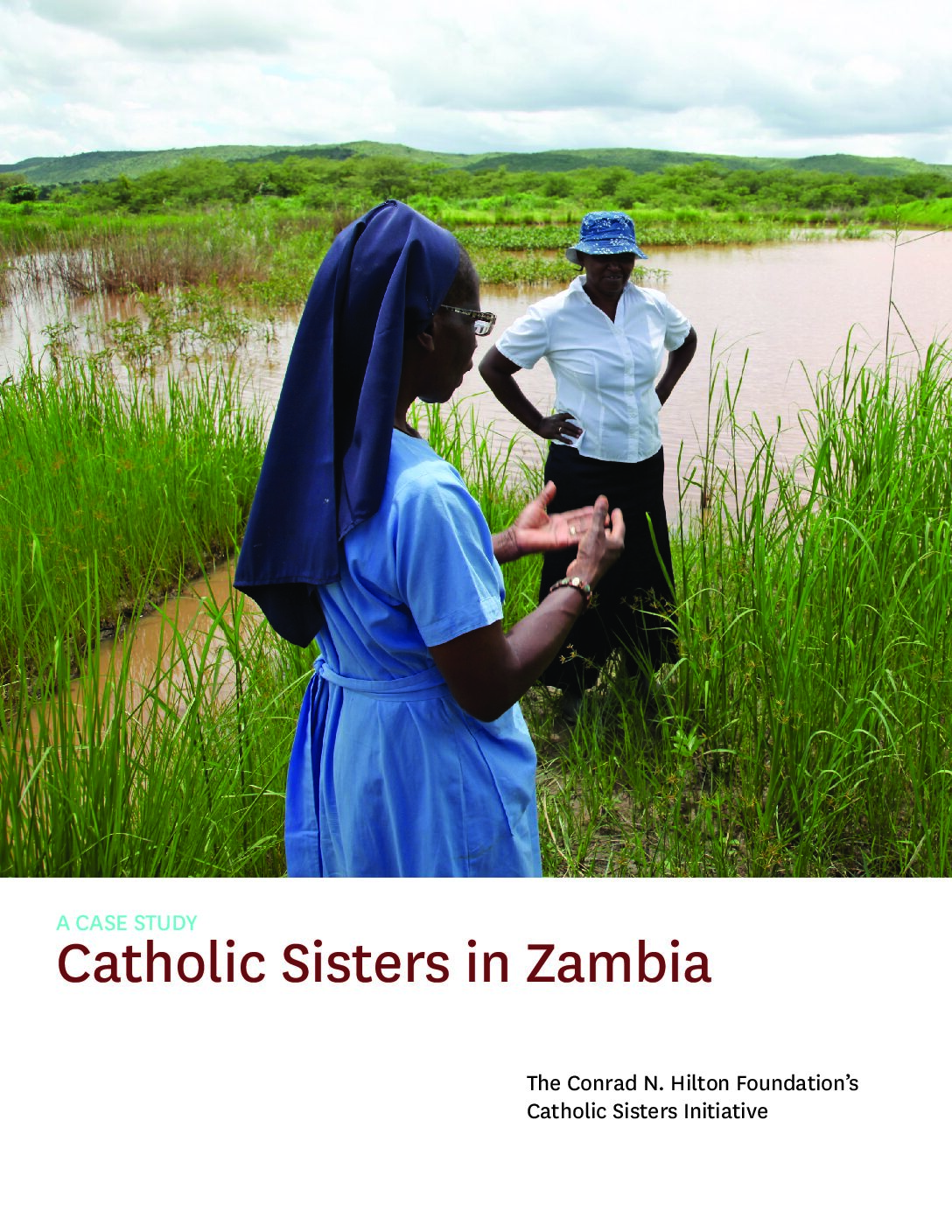Introduction
Unique Role of Catholic Sisters
This case study seeks to illuminate the unique role that Catholic sisters play in Zambian society and the communities they serve. It also highlights why it is so critical for the Conrad N. Hilton Foundation’s Catholic Sisters Initiative to support them. When sisters were asked what differentiated them from others who provide health, education or other social services, they responded that:
“We embrace the whole person.”
“We bring Christ to the people.”
“We have a commitment that goes beyond the average person.”
“Sisters never retire from service.”
“Our presence inspires confidence in other people.”
“We unify. People drop political differences around sisters.”
Zambian sisters see themselves as spiritual workers embracing the poorest and most vulnerable members of Zambian society. Sisters go to parts of Zambia where others refuse to serve and provide strong spiritual witness through their work. They have a unique perspective on the needs of Zambian communities and vulnerable populations because they live side-by-side with people and intimately understand the challenges that they face on a daily basis. In turn, communities trust sisters and see them as honest interlocutors with larger state and private institutions. Zambian sisters truly represent Conrad N. Hilton’s vision of sisters as those who “devote their love and life’s work for the good of mankind.”
Methodology
The Conrad N. Hilton Foundation’s Catholic Sisters Initiative launched its first five-year strategy in 2013. As the measurement, evaluation and learning (MEL) partner of the Sisters Initiative, the Center for Religion and Civic Culture (CRCC) at the University of Southern California has been documenting and analyzing the Sisters Initiative’s grant-making strategy since 2014.
At the request of the Sisters Initiative, CRCC is conducting research to support the development of the second iteration of its strategy for 2018-2023. In order to understand the needs of Catholic sisters and their missions in Sub-Saharan Africa, CRCC was tasked with developing country case studies for Zambia, Uganda and Nigeria.
CRCC’s methodology is based on the country assessment model used by development organizations. Such assessments can provide a landscape analysis in a particular field (e.g., education), a risk analysis, a list of key partners, and/or the identification of particular regions with the most need.
They are typically based on a literature review and at least 2-3 weeks in country, with time to interview a wide variety of stakeholders. They can provide field-level, real-time information to make decisions on whether to invest time and resources into tackling an issue in a country, as well as to develop an initial country strategy so that an intervention has the highest chance of success.
Rather than focus on a particular field, this case study is unique in that it seeks to understand the ability of one set of actors—Catholic sisters—to meet the needs within the country. It responds directly to the Sisters Initiative’s request for information on five sectors that it is considering funding through its second strategy (see section 4, Country Priorities): food security, education, maternal and child health, human trafficking, and entrepreneurship and microfinance.
In each of these areas, which align with the UN Sustainable Development Goals (SDGs), the report documents the needs, the role of sisters, key players that could serve as partners, challenges and opportunities.
Based on a literature review, data review, focus group discussions and interviews, food security emerged as a primary issue in Zambia. This report should be considered the beginning of a conversation on how the Sisters Initiative’s next strategy can be implemented at a country level, and not a full-fledged country assessment. CRCC’s relatively brief time in country (four days) and limited access to stakeholders constrain the conclusions that can be drawn from this report. Sectors beyond those that CRCC explored during this preliminary investigation may be priorities for Zambia as well. If the Sisters Initiative decides to invest in Zambia, it could employ a consultant who is an expert in a particular sector to broaden and deepen the analysis available here and to provide more specific recommendations on how to have the greatest impact on that sector in Zambia. Nonetheless, this report concludes with an initial assessment of Zambia’s strengths, weaknesses, opportunities and threats, along with recommendations for the Sisters Initiative to consider as it crafts the second iteration of its strategy.
Click here to read the full report.
